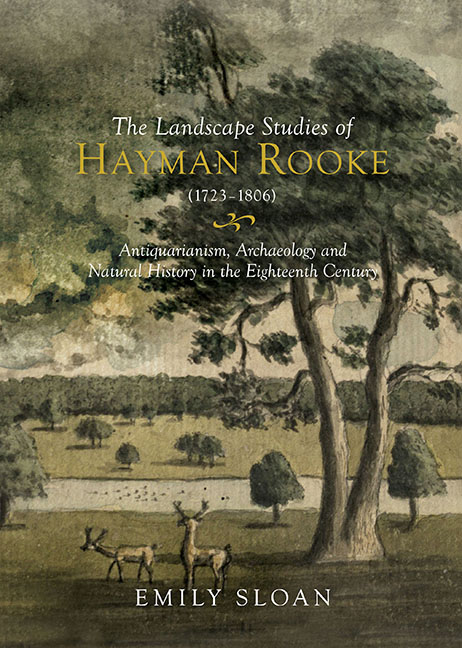 The Landscape Studies of Hayman Rooke (1723–1806)
The Landscape Studies of Hayman Rooke (1723–1806) Major Hayman Rooke was an eighteenth-century soldier, antiquarian, meteorologist, amateur artist and, by all accounts, an upright and affable character. He was also extraordinarily busy and spent much of his time out and about visiting friends and travelling, exploring traces of the past in the landscape, scrambling up rock faces to look at caves, or riding around estate plantations examining trees. Rooke recorded his many expeditions in more than 400 sketches and published his findings in a range of outlets including journals, books and pamphlets. Major Rooke's work on antiquarianism and natural history offers an opportunity to examine the interpretation of landscape during the eighteenth century; that is, some of the ways in which antiquarian study contributed to a sense of place and to broader political and social experiences and interpretations of landscape. This includes how landscapes were explained and understood – how antiquarian and natural historical practice functioned as a form of engagement with place. Locality was, of course, significant to antiquarian and natural history studies, given the place-specificity of their subjects; but this place-specific information was shared as well as contributing to a wider project of the discovery of a national landscape, meaning that eighteenthcentury communication networks played a significant role in the process of knowledge formation.
These questions can be approached through a study of both the theoretical and physical spaces of the eighteenth century, especially those in which Rooke was actively engaged. These can be seen as falling into three wide-ranging and interlinked spaces of investigation: regional study, spaces of exchange and spaces of practice. Regional study refers to the spatial or territorial loyalties of the antiquarian to a particular area, the role and influence of the county history as a mode of spatial definition and the relationship between antiquarianism, regional study and chorography – the impact of regional study on ideas of politics and identity, a sense of belonging in place. These were of course greatly affected by the personal mobility of antiquarians and natural historians like Rooke, and Rooke's own travels are discussed. The spaces of exchange – the networks of correspondence, publications and meetings through which ideas and artefacts travelled, and which contributed to the creation and reinforcement of antiquarian reputations – make it possible to trace the ways in which knowledge was created and negotiated.
To save this book to your Kindle, first ensure [email protected] is added to your Approved Personal Document E-mail List under your Personal Document Settings on the Manage Your Content and Devices page of your Amazon account. Then enter the ‘name’ part of your Kindle email address below. Find out more about saving to your Kindle.
Note you can select to save to either the @free.kindle.com or @kindle.com variations. ‘@free.kindle.com’ emails are free but can only be saved to your device when it is connected to wi-fi. ‘@kindle.com’ emails can be delivered even when you are not connected to wi-fi, but note that service fees apply.
Find out more about the Kindle Personal Document Service.
To save content items to your account, please confirm that you agree to abide by our usage policies. If this is the first time you use this feature, you will be asked to authorise Cambridge Core to connect with your account. Find out more about saving content to Dropbox.
To save content items to your account, please confirm that you agree to abide by our usage policies. If this is the first time you use this feature, you will be asked to authorise Cambridge Core to connect with your account. Find out more about saving content to Google Drive.